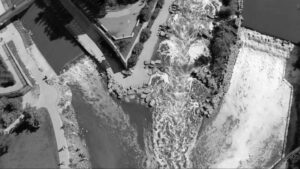Waste management is a crucial part of mitigating individual impact against climate change – but there’s a lot of different rules, regulations, and changing science for a lot of different types of waste. One waste type that is often forgotten about, but has adverse environmental, communal, and personal health impacts is improper medication disposal. From landfills, and toilet drains, to the dark corners of your medicine cabinets, there seemed to be few ways to properly dispose of medications…until now! Thanks to the Colorado Department of Public Health and Environment (CDPHE) and Colorado Consortium for Prescription Drug Abuse Prevention’s Colorado Medication Take Back Program, with over 300 drop off sites, Coloradans can feel secure knowing that their unused medication won’t accidentally end up in our water supply, soil, or local waterways.
Improper medication disposal of medications has a wide range of negative environmental impacts, especially on local waterways. Unused medications, whether in landfills, wastewater streams (sewage), or improperly disposed into local waterways, can permeate into groundwater supplies, or local waterways, like the beloved South Platte River here in Denver. Majority of these modes to deal with our waste (water treatment/landfills), don’t have systems of infrastructure specific to leaching of medications into water supply (“Drugs in the Water”). Nationally, 40% of water supplies are permeated by pharmaceuticals, with trace amounts of drugs accumulating in some animal species as well (Associated Press, 2008). This is a big problem for local waterways, general water supply, and ecosystem health, hence why it has become such an important issue to discuss – and why we are so happy to discuss it!
To protect waterways, wildlife, and the communities around these environments, utilize the Colorado Medication Takeback Program! This program provides Coloradans with the power to properly dispose of their medications, and here is how to do it:
It’s easy to properly dispose of your old medications. Just follow these four steps:
- Collect all the unused or expired medications you want to dispose of. Make sure to remove any personal information from prescription bottles or packaging.
- Place your medications in a sealable bag or container to prevent leakage or spills. This helps keep the dropbox clean and safe.
- Find your nearest dropbox at TakeMedsSeriously.org/safe-disposal
- When you arrive at the dropbox location, open the dropbox and place your sealed bag or container with medications inside. Some dropboxes may have specific instructions or signage, so follow any provided guidelines.
It’s that easy and it makes a world of difference!
[Sidebar: Accepted Medications] Frequently Asked Questions
What Can You Drop Off?
You can use Colorado’s Medication Takeback Program to dispose of:
- Prescription patches
- Over-the-counter medications
- Prescription medications (Including opiodis and other controlled substances)
- Prescription creams and ointments
- Unused medication inhalers (if empty)
What can NOT be disposed of?
- Sharps or syringes
- Trash
- Thermometers
- Chemotherapy medication
- Illicit substances (including marijuana)
To find more information and resources on this issue and program, check out their website; https://takemedsseriously.org/safe-disposal/ and make a plan for safely storing, using, and disposing of your personal medications. By utilizing the resources in Colorado Medication Take Back Program, you are being a steward to your communities, local waterways, and yourself.
En Espanol
Desechar adecuadamente tus viejos medicamentos es fácil. Solo sigue estos cuatro pasos:
1. Junta todos los medicamentos que ya no utilizas o que caducaron y quieres desechar. Asegúrate de quitar la información personal de los envases de medicamentos recetados.
2. Coloca los medicamentos en una bolsa o recipiente que cierre bien para evitar que se derramen. Esto ayuda a mantener el buzón limpio y seguro.
3. Encuentra el buzón más cercano en TakeMedsSeriously.org/safe-disposal
4. Cuando llegues al sitio del buzón, ábrelo y coloca en su interior tu bolsa o recipiente bien cerrado con los medicamentos adentro. Algunos buzones pueden tener instrucciones o señalizaciones específicas, de ser así, asegúrate de seguir las indicaciones allí provistas.
¡Es así de fácil y hace una gran diferencia!
[Barra lateral: Medicamentos aceptados] Preguntas frecuentes
¿Qué puedes dejar en el buzón?
Puedes utilizar el Programa de Devolución de Medicamentos de Colorado para desechar:
Medicamentos de venta libre
Medicamentos recetados (incluyendo opioides y otras sustancias controladas)
Parches medicinales recetados
Cremas y pomadas recetadas
Inhaladores que ya no uses (si están vacíos)
¿Qué NO deberías dejar en el buzón?
Basura
Objetos cortantes y punzantes o jeringas
Termómetros
Medicamentos para quimioterapia
Drogas ilícitas (incluso marihuana)
Programa de Devolución de Medicamentos de Colorado | TakeMedsSeriously.org/safe-disposal
Works Cited
The Associated Press. “Drugs found in more cities’ water systems – The Denver Post.” The Denver Post, 11 September 2008, https://www.denverpost.com/2008/09/11/drugs-found-in-more-cities-water-systems/. Accessed 14 November 2023.
“Drugs in the water.” Harvard Health, 1 June 2011, https://www.health.harvard.edu/newsletter_article/drugs-in-the-water. Accessed 14 November 2023.
Take Meds Seriously. “Safe Disposal – Take Meds SeriouslyTake Meds Seriously.” Take Meds Seriously, https://takemedsseriously.org/safe-disposal/. Accessed 14 November 2023.



 November Break Camp
November Break Camp